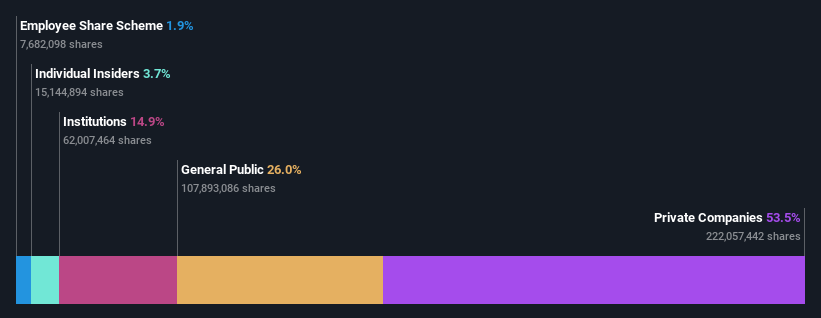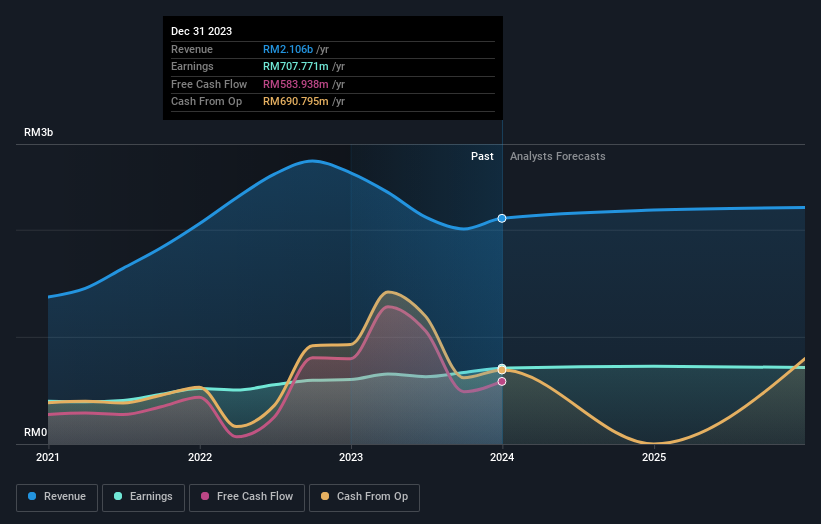Individual investors own 26% of United Plantations Berhad (KLSE:UTDPLT) shares but private companies control 54% of the company
Key Insights
Significant control over United Plantations Berhad by private companies implies that the general public has more power to influence management and governance-related decisions
54% of the business is held by the top 2 shareholders
A look at the shareholders of United Plantations Berhad (KLSE:UTDPLT) can tell us which group is most powerful. With 54% stake, private companies possess the maximum shares in the company. Put another way, the group faces the maximum upside potential (or downside risk).
Individual investors, on the other hand, account for 26% of the company's stockholders.
In the chart below, we zoom in on the different ownership groups of United Plantations Berhad.
Check out our latest analysis for United Plantations Berhad
What Does The Institutional Ownership Tell Us About United Plantations Berhad?
Many institutions measure their performance against an index that approximates the local market. So they usually pay more attention to companies that are included in major indices.
United Plantations Berhad already has institutions on the share registry. Indeed, they own a respectable stake in the company. This suggests some credibility amongst professional investors. But we can't rely on that fact alone since institutions make bad investments sometimes, just like everyone does. When multiple institutions own a stock, there's always a risk that they are in a 'crowded trade'. When such a trade goes wrong, multiple parties may compete to sell stock fast. This risk is higher in a company without a history of growth. You can see United Plantations Berhad's historic earnings and revenue below, but keep in mind there's always more to the story.
United Plantations Berhad is not owned by hedge funds. Looking at our data, we can see that the largest shareholder is Brothers (Holdings) Pte. Ltd. with 48% of shares outstanding. Meanwhile, the second and third largest shareholders, hold 6.0% and 5.0%, of the shares outstanding, respectively. Additionally, the company's CEO Carl Bek-Nielsen directly holds 1.3% of the total shares outstanding.
After doing some more digging, we found that the top 2 shareholders collectively control more than half of the company's shares, implying that they have considerable power to influence the company's decisions.
Researching institutional ownership is a good way to gauge and filter a stock's expected performance. The same can be achieved by studying analyst sentiments. While there is some analyst coverage, the company is probably not widely covered. So it could gain more attention, down the track.
Insider Ownership Of United Plantations Berhad
The definition of an insider can differ slightly between different countries, but members of the board of directors always count. Management ultimately answers to the board. However, it is not uncommon for managers to be executive board members, especially if they are a founder or the CEO.
Insider ownership is positive when it signals leadership are thinking like the true owners of the company. However, high insider ownership can also give immense power to a small group within the company. This can be negative in some circumstances.
Our most recent data indicates that insiders own some shares in United Plantations Berhad. It is a pretty big company, so it is generally a positive to see some potentially meaningful alignment. In this case, they own around RM379m worth of shares (at current prices). It is good to see this level of investment by insiders. You can check here to see if those insiders have been buying recently.
General Public Ownership
With a 26% ownership, the general public, mostly comprising of individual investors, have some degree of sway over United Plantations Berhad. While this size of ownership may not be enough to sway a policy decision in their favour, they can still make a collective impact on company policies.
Private Company Ownership
It seems that Private Companies own 54%, of the United Plantations Berhad stock. It's hard to draw any conclusions from this fact alone, so its worth looking into who owns those private companies. Sometimes insiders or other related parties have an interest in shares in a public company through a separate private company.
Next Steps:
I find it very interesting to look at who exactly owns a company. But to truly gain insight, we need to consider other information, too. Case in point: We've spotted 1 warning sign for United Plantations Berhad you should be aware of.
Ultimately the future is most important. You can access this free report on analyst forecasts for the company.
NB: Figures in this article are calculated using data from the last twelve months, which refer to the 12-month period ending on the last date of the month the financial statement is dated. This may not be consistent with full year annual report figures.
Have feedback on this article? Concerned about the content? Get in touch with us directly. Alternatively, email editorial-team (at) simplywallst.com.
This article by Simply Wall St is general in nature. We provide commentary based on historical data and analyst forecasts only using an unbiased methodology and our articles are not intended to be financial advice. It does not constitute a recommendation to buy or sell any stock, and does not take account of your objectives, or your financial situation. We aim to bring you long-term focused analysis driven by fundamental data. Note that our analysis may not factor in the latest price-sensitive company announcements or qualitative material. Simply Wall St has no position in any stocks mentioned.

 Yahoo Finance
Yahoo Finance 

